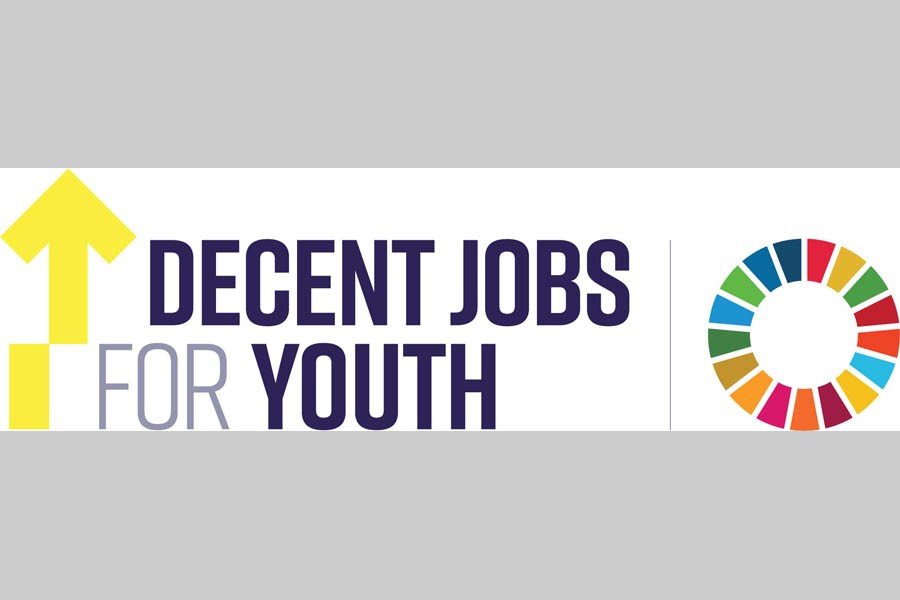
Published :
Updated :

It is heartening to know that Bangladesh is the first Asia-Pacific country to commit to the global initiative on Decent Jobs for Youths. It happened with the pledge to train 250,000 youths on digital skills and deliver 340,200 apprenticeships by 2023. At the Asia-Pacific Forum on Sustainable Development in Bangkok late last month, Bangladesh announced its commitment through the 'a2i-Innovate for All', a flagship programme of the government.
'A2i - Innovate for All' works with a 'whole-of-government' approach by leveraging rapid expansion of technologies to create the right environment for demand-driven skills development in the country. Following the training on multiple digital skills, the link to employment opportunities for trained youths would be facilitated by the government, the private sector, development partners and the NGOs. The a2i programme's commitments to Decent Jobs for Youth build on a multi-sectoral partnership, with a2i as the main implementing partner, and support and investment coming from the private sector and other development partners.
Decent Jobs for Youth is the global initiative to scale up action and impact on youth employment in support of the UN's Sustainable Development Goals (SDGs). This platform is a hub for catalysing partnerships, collaboration and coordinated action grounded in evidence-based strategies.
The SDGs envisage decent work for sustainable economic growth, aiming to increase labour productivity, reduce unemployment rate, and improve access to financial services and benefits. Encouraging entrepreneurship and job creation are instrumental to this, as are effective measures to eradicate forced labour, slavery and human trafficking. With these targets in mind, the objective is to achieve full and productive employment, and decent work, for all women and men by 2030.
The focus on demand-driven skills is critical to meet the needs of local and international job markets, and to equip young people with the right skills for 21st century employment opportunities. According to the International Labour Organisation (ILO), decent work involves opportunities for work that are productive and deliver a fair income, security in the workplace and social protection for families, better prospects for personal development and social integration, freedom of employees to express concerns, organise and participate in the decisions that affect their lives and equality of opportunity and healthcare for all women and men. "Each year, more than two million young Bangladeshi men and women enter the labour market, in desperate need of decent jobs and livelihoods", said ILO's Bangladesh country director Tuomo Poutiainen. He said their experience showed that supporting youths in their school-to-work transition, using industry-led apprenticeships and offering the latest digital skills training would help Bangladesh's young people better prepare for the jobs of the 21st century.
The ILO Decent Work Agenda is a balanced and integrated approach to pursue the objectives of full and productive employment and decent work for all at global, regional, national, sectoral and local levels. It has four pillars: standards and rights at work, employment creation and enterprise development, social protection and social dialogue.
The Decent Work Agenda requires national and international actors to commit to the objective of creating quality jobs globally and to pursue cooperative solutions to this challenge. However, governments struggle to convince the people that development and job creation abroad are imperative to prosperity and employment at home. Some governments also face the temptation to close markets and lower labour standards to remain competitive in a world economy that is blamed for depressing wages and working conditions.
As regards Bangladesh's pledge to train 250,000 youths on digital skills and deliver 340,200 apprenticeships by 2023, it does not seem convincing that digital skill development alone will take care of decent jobs. This is obviously because skills development is only a part of the whole chain of decent employment, because at its best, it can empower the incumbents but not necessarily ensure good salary and other perks along with good work environment. Skills matter hugely, and of course digital skills-- the very foundation of doing works efficiently. But these skills have to be set in motion and reinforced by knowledge in the area of activity in which one aspires to be employed.
It is not clear from the pledge made at the Asia-Pacific Forum on Sustainable Development whether skills training under the 'a2i-Innovate for All' programme will include a wide range of knowledge-based skill development. The programme cannot be expected to deliver in isolation unless it matches its training tools with the knowledge base in the country's educational institutions. Otherwise, the programme might turn out to be no more than a technical aid having little to do with combining knowledge and skills to benefit the youths in seeking the right jobs at home or abroad. Equally important, if not more, is the need for opportunities in the job markets for applying the knowledge-based skills. So, it is also about making adjustments between demand and supply.


 For all latest news, follow The Financial Express Google News channel.
For all latest news, follow The Financial Express Google News channel.